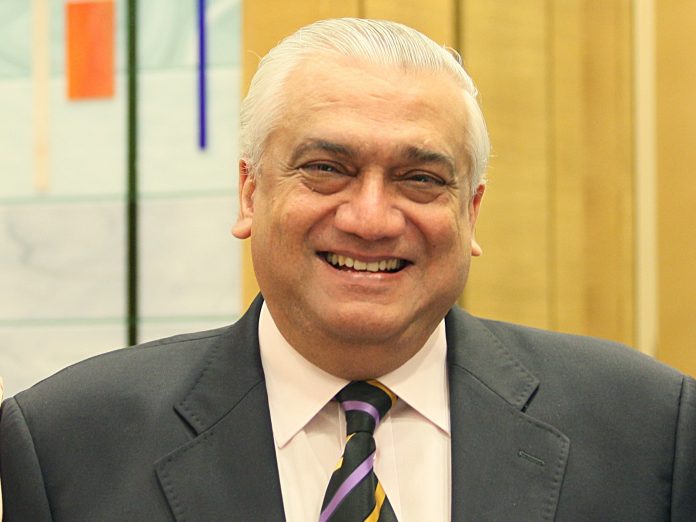– Mohd. Naushad Khan
As war looms larger in West Asia, former Indian Ambassador Talmiz Ahmad’s warnings from last year resonate even more sharply in today’s volatile landscape.
The Israel-Iran conflict has crossed a critical threshold. What once simmered beneath the surface has erupted into direct, sustained warfare, drawing in global powers and destabilising the Middle East in ways not seen since the 2003 Iraq War. The spiral of retaliations – Israeli airstrikes deep into Iranian territory, and Iran’s unprecedented missile and drone assaults breaching Israeli defences – has created a tinderbox of regional insecurity.
In an interview with this scribe, Ambassador Talmiz Ahmad had cautioned and predicted last year that the real strategic obsession of Israel and the U.S. was Iran – not Palestine. As recent events have shown, he was right. “The core of Israeli policy has been the neutralisation of Iran – not through diplomacy, but by force,” Ahmad explained. “This obsession is driven less by actual threat assessments and more by ideology, political expediency, and fear-mongering.” This obsession has become more dangerous in 2025 as both Netanyahu and a fractured Israeli leadership continue to escalate the conflict under the guise of “defensive necessity.”
Ahmad’s analysis pointed to a recurring theme in Israeli politics: Netanyahu’s use of conflict as a political shield. In 2025, Netanyahu is again under mounting internal pressure – this time from a war-weary public and a coalition teetering on collapse. “He’s using Iran the way he used Gaza: to divert attention from domestic failures,” said Ahmad. “He needs a forever war to maintain political relevance.”
The conflict has already claimed thousands of lives and triggered regional disruptions, including threats to Gulf oil infrastructure, increased attacks on U.S. bases in Iraq and Syria, and destabilising strikes in Lebanon and Yemen. The spectre of a broader war now looms, with the U.S. dragged further into the fray – despite clear evidence that military solutions only deepen chaos.
Ahmad’s assertion that Iran was being pushed past its limits has been borne out. Iran, long exercising what it called “strategic restraint,” has now responded with direct strikes on Israeli and American assets, marking a radical shift from the proxy conflicts of the past. “Israel underestimated Iran’s capabilities for years,” Ahmad noted. “But recent strikes – especially those using precision and hypersonic missiles – have shattered the myth of Israeli invincibility.” This evolution in Iran’s military doctrine, triggered by what Tehran views as existential threats, has increased the risk of a multi-front war involving Hezbollah, the Houthis, and Shiite militias in Iraq.
Ahmad also predicted that U.S. involvement would hinge on internal contradictions – especially during an election year. In 2025, President Joe Biden faced a tough re-election campaign against a Republican opponent threatening “decisive action” against Iran. Yet military escalation remains deeply unpopular among American voters. “U.S. policy is torn between Israel’s lobbying and its own national interests,” said Ahmad. “Regime change in Tehran sounds good in D.C., but Americans remember Iraq. They know what endless war looks like.” While Biden had tried to balance support for Israel with calls for de-escalation, Washington’s credibility is fraying. The 2018 withdrawal from the JCPOA nuclear deal – a move pushed by Netanyahu and cheered by hardliners – set the stage for today’s crisis. Since then, Iran has ramped up uranium enrichment to near-weapons-grade levels, while the IAEA’s access has been curtailed.
He points to India’s nuclear history and North Korea’s defiance as proof that military threats cannot eliminate nuclear programmes. “The JCPOA worked,” Ahmad insisted. “Iran complied. But ideology triumphed over evidence. Now we’re dealing with the fallout of that failure.” His warning goes beyond Iran. He emphasises the danger of neglecting the Palestinian issue, which remains a moral and strategic black hole. With Gaza still in ruins and Israeli settlement expansion continuing unabated, Ahmad argues that lasting peace in the Middle East cannot be achieved without justice for Palestinians. “You cannot solve the Iran problem without addressing Palestine. They are linked by decades of injustice, occupation, and Western hypocrisy.”
Ahmad’s words carry the weight of lived experience and diplomatic foresight. The current trajectory – of maximalist rhetoric, mutual escalation, and zero accountability – leads only to disaster. Instead, he calls for a radical reset: • Immediate ceasefire between Israel and Iran • Re-engagement with the JCPOA under IAEA verification • International pressure on Israel to halt Gaza hostilities and return to negotiations with the Palestinians • De-militarisation of U.S. policy in the region, with renewed focus on diplomacy.
In his final words, Ahmad issues a stark warning: “We are witnessing the unmaking of peace in real time. Unless we reverse course now – through diplomacy, restraint, and justice – we will inherit a Middle East engulfed in flames for a generation.”




